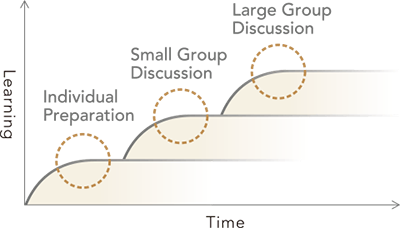Four-day courses over two weekends
With one course in the MBA program completed over two weekends, professionals can earn an MBA even with a busy work schedule. MBA lectures require participants to prepare individually, refine ideas through group sessions and fieldwork, and put the ideas and concepts they have formulated up for discussion before they can be implemented in practice at the office.
In lecture, students search for answers in more depth while taking the opinions of their peers and the course instructor into consideration. By doing this repeatedly, students can acquire the ability to make business decisions based on a wide range of perspectives and new ideas. The curriculum is designed to develop the skills necessary to confront market and management issues from a new perspective.
-

Creation
Participants will learn to understand the essence of entrepreneurship, and acquire diffusive thinking and value creation techniques to create new value. They will also understand the importance of courage in tackling new challenges, the ability to set hypotheses in ambiguous situations, and the mindset to learn from failure. In the end, participants will learn how to build new business models, innovate existing business models, communicate effectively, and improve practical strategic thinking and execution skills.
- Innovation & Creative Thinking
- MBA Essentials
- Business Model Design
- Managerial Accounting & Control
-

Change
These program courses foster the skills and power to bring about change not only in goods and services themselves, but also in the way they are provided, the produced, and organized. Specifically, participants will gain familiarity with the sources of change: entrepreneurship, leadership, product development, technology management, and globalization.
- Digital Marketing
- Service Innovation
- Entrepreneurship and Family Business
- Business Succession & Innovation
-

Opportunity
Participants will acquire the ability to focus on the essence of problems, discover real issues, and find latent needs. Through the latest case studies and practical workshops, students will work through problems, market opportunities, and reform opportunities in the current business scene, and develop the ability to create new value.
- Financial Analysis
- Business Economics
- Designing Organizations
- Leading Multicultural Teams
- Aligning Strategy and Sales
- Internal Control System & Risk Management
- Strategic Negotiation
- Business Ethnography
-

Execution
Value creation and value acquisition are the two wheels of the new business creation process. In these program courses, participants learn practical approaches to embody newly created value, deliver it where it is needed, and realize results. By acquiring the skills necessary to be an effective leader responsible for planning management strategies, we can strengthen the capabilities of the organization.
- Innovation Management
- Discussion Leadership
- Risk Management and Sustainability
- Corporate Governance
- Financial Market Simulation
- Financial Market Simulation
- Financing of Innovation
- Strategic Change Leadership
- Entrepreneur & Strategy
Courses
Economy in Emerging Markets
Prof. Seiichiro Iwasawa/Ph.D. (Harvard University)
For global companies in developed countries, business development in emerging markets has become a stimulus for the creation of various new businesses. In this course, participants will learn about reverse innovation, referring to the latest findings in behavioral economics. This is because what business innovation requires is an insightful understanding of human behavior.
Business Ethnography
Prof. Nobuyuki Nomura/Ph.D. (Tokyo University)
Ethnography has been developed as a method of observing research subjects. Participants will learn how to apply this method to business, specifically by observing the environment in which end-users live and the way they think about products and services, and by using new marketing methods to build hypotheses based on the findings.
Innovation & Creative Thinking
Prof. Yasutomi Kitahara/ Ph.D. (Waseda University)
Through workshops and group discussions, participants will have the opportunity to experience their own discovery ("Aha!" moment). By experiencing and understanding the process of creating a new business, participants will develop their creative thinking skills and explore differences in management style and structure.
Business Model Design
Prof. Ryusuke Koyama/MBA (Thunderbird School of Global Management)
Analyzing the structure of a business model is one of the most important elements in developing a new business. By using a framework that structures the various elements that make up a business model, we can visually analyze the business model, gain a structural understanding of the existing business model, and build a new business model that can function in the real world.
Case Method
The three-stage case method learning process
Source: L. A. Mauffette-Leenders, J. A. Erskine, and M.R. Leenders (2001), Learning with Cases 2nd ed., London, Ontario, Canada: Ivey Publishing.
-
STEP1
Individual preparation: review materials and formulate hypotheses
Casebooks are distributed electronically to course participants two weeks before the first lecture of the course. By reading cases, the success factors and struggles of companies are examined. While referring to the articles and recommended books provided by the instructors, students will form their own thoughts on the assignment before the lecture.
-
STEP2
Group discussion: discuss and summarize opinions
In small group sessions, participants gather to exchange opinions on the issues and share their thoughts. By expressing their diverse opinions under the supervision of the group leader, the participants are able to organize their thoughts and deepen their understanding of the case.
-
STEP3
Plenary discussion: pursuing the best business decisions as a class
Questions are discussed under the facilitation of the instructor. The clash of opinions from various perspectives leads to deeper discussions. The ultimate goal of the case method is not to come to a single conclusion in class, but to rethink plans of action in specific situations.
Experience the case method
-

-

-
13:30-15:30 UTC+9
- Entry Open
- Nagoya
Global MBA & MSc Open Campus in Nagoya: Admissions Guidance, Campus Tour, Q&A

-

-


 Brochure
Brochure
 Info Session
Info Session
 Application
Application
 Alumni Voices
Alumni Voices









